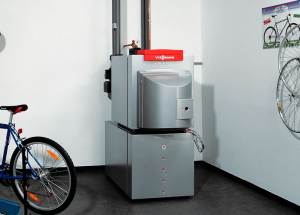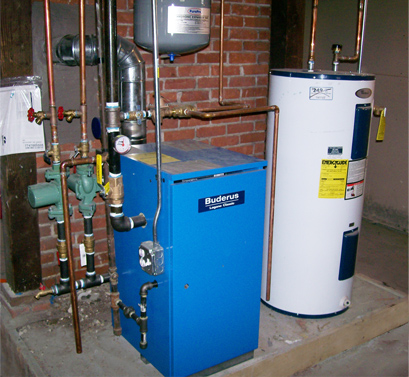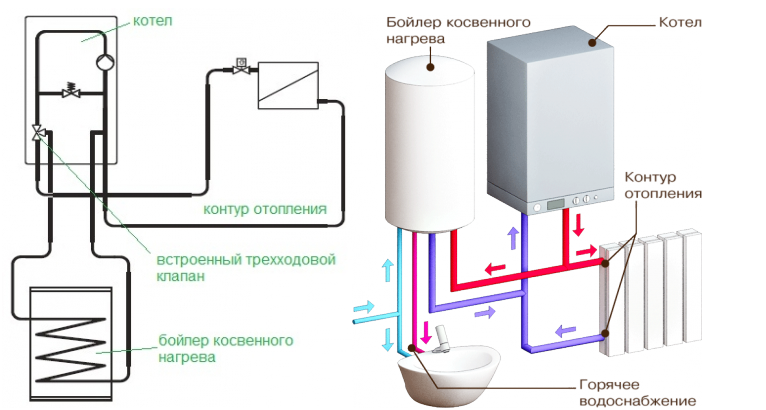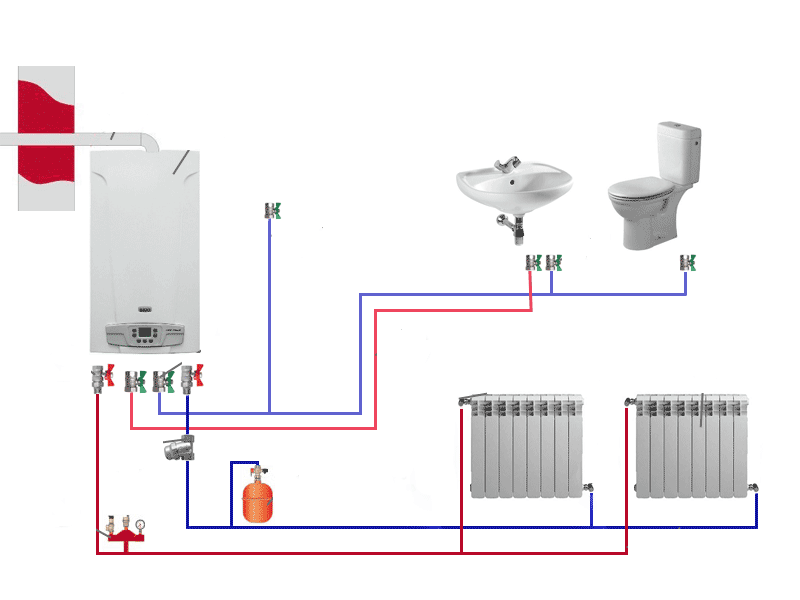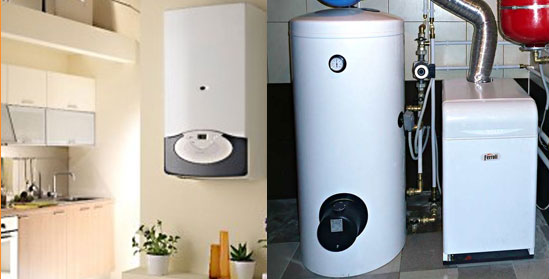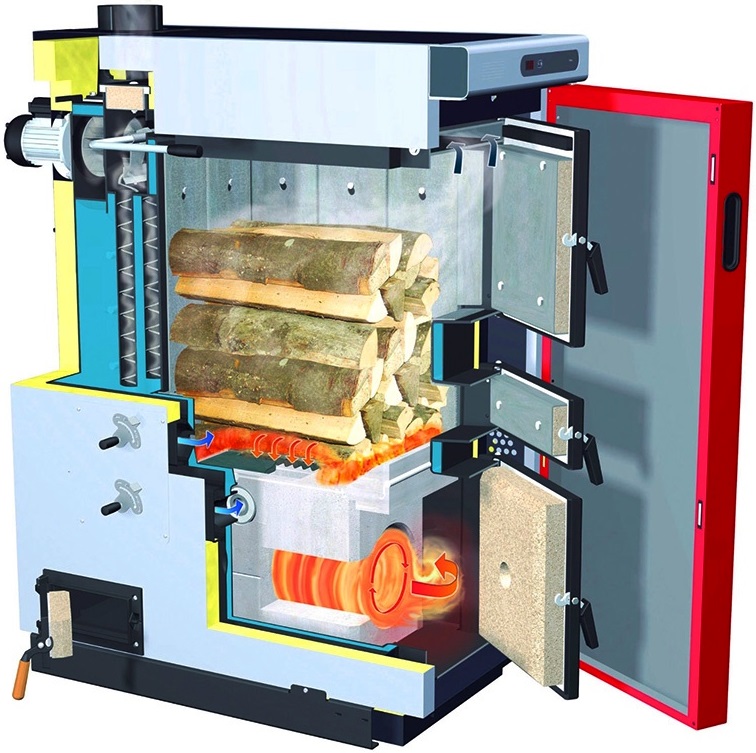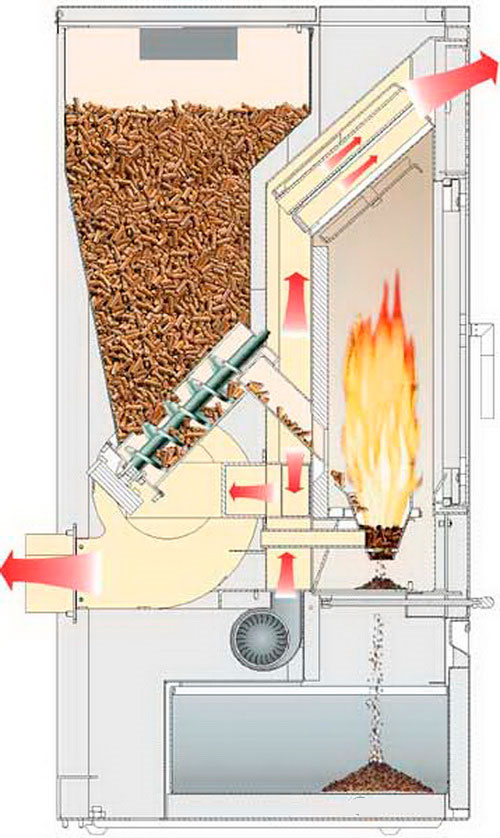The climate of our country makes us seriously think about heating the house. Now on the market there are many heating boilers working on different fuels. In this article we will talk about them, as well as how to calculate the necessary capacity of the heater and choose it for a private house.
Content
Boilers for solid and liquid fuel
Now on the market you can find boilers working both on solid fuel and diesel fuel. The internal device is modified and they have two combustion chambers, between which you can switch.
Combined devices Heating is available immediately with two cameras. For its operation it is enough to turn on the burner or the automation will do it yourself. Such devices can be distinguished by the degree of automation and control features:
Models with full automation. The main raw material for heat is solid fuel (TT). The system has a temperature sensor connected to the boiler controller. When the temperature falls, indicating a burn-out in the furnace of raw materials, the automatic signal is given to switch on the diesel burner. The controller of the device is connected to the temperature sensors in the room, this makes the control accurate.
Boiler with manual switching. The burner is turned on manually after a complete burning of the raw material in the furnace.
Biofuel The boilers already have a built-in protection system that prevents the possibility of a fire. Basically, safe use of such models is associated with compliance with fire safety rules. In such devices, two types of fuel are used, each of which is dangerous. Solar oil can serve as a catalyst for ignition of solid raw materials and will support combustion for a long time.
To avoid this, the following requirements must be taken into account:
- fuel storage facilities must be arranged separately from each other;
- the amount of stored diesel should not exceed the required size, than for 5 days of work;
- to store liquid fuel it is necessary in heated premises;
- presence of fire-extinguishing means;
- emergency lighting should be provided.
The following rules must be observed in the boiler rooms:
- equipped supply and exhaust ventilation;
- the boiler is installed on a non-flammable base, the floor can be tiled;
- smoke alarm is installed;
- lighting devices should be with a sealed enclosure and in a braid of metal;
- the diesel burner should be regularly cleaned and inspected;
- when installing the chimney, it is necessary to provide fireproof cuts for the passage of floors and roofing of the building.
Compliance with these requirements will make the operation of the boiler safe.
Gas boilers for boiler room
It is convenient and economical to install gas heaters in a private house. Gas is one of the cheapest fuels. Of course, before installing the boiler it is necessary to fulfill a number of requirements. Most often for such equipment a room with non-combustible materials is taken away. Also, such a device can be installed in the kitchen.
For this you need to consider the following:
- the floor space should not be less than 15 sq.m;
- height of ceilings from 2,2 m;
- passages between objects of an interior of 70 sm;
- must be a window leaf;
- the glazing area should be at least 0.3 square meters. m per 1 cubic meter of volume;
- the walls, floor and ceiling must be finished with non-combustible materials.
Only if these requirements are fulfilled, the gas service will allow the installation of a heating appliance.
Now on the market you can find two varieties of such boilers:
- single-circuit;
- two-circuit.
Let us consider them in more detail.
Single-circuit, double-circuit boilers
Many people are asking which option to choose. One contour model heats the water only for heating. The truth can be purchased separately by the boiler and connected to the system. It will accumulate hot water, which can be used for domestic needs. Moreover, modern models of one contour boilers are equipped with a system for connecting storage devices, but for the old model everything must be selected by a specialist.
A dual-circuit boiler has a special device for water supply, it is an additional heat exchanger. The water from the cold water supply is heated and enters the heating system, as soon as the hot water tap opens, the valve changes position, and water enters the heat exchanger where it is heated already for domestic use. Particular attention should be paid to the power of the device. To fill the tub with hot water you need 18 kW, for a shower - 10 kW. But, when you open the second tap with hot water in the shower can go cold water. To avoid such situations it is necessary to purchase a boiler with a power of 28 kW. For one circuit boiler the power is not so important, it is selected depending on the heated area. If you install a boiler, then I choose it based on the number of tenants. The standard volume of the drive is 100 - 200 liters. Which is better to choose? This question can not be answered unambiguously. If you are constrained in the square and you simply have nowhere to put the boiler and the water heating column separately, the dual-circuit model is an excellent option.
Electro boiler for heating the house
Electric boilers are popular in recent times. They are chosen for safety, and also if the gas pipeline does not pass near the house. A rich assortment makes it possible to select the device individually.
The main elements of the boiler are:
- heat exchanger (heating component, tank and coolant);
- control and monitoring units;
- body.
All models operate on the same principle, regardless of the manufacturer. A heating element located in the heat exchanger converts electricity into heat. Due to what happens heating of the coolant, which through the pipes enters the radiators of heating.
Electric boilers can be:
- electrode;
- induction;
- TENovye.
The latter are in great demand, and the country and the manufacturer do not significantly differ.
They can also differ in operating voltage:
- for heating the house 220 V;
- three-phase boilers of voltage 380 V;
- models of mixed type.
Like other heating appliances, electric boilers have advantages and disadvantages.
The pluses are:
- easy installation;
- it is not required to build a chimney;
- do not need to allocate a special place;
- compact and light in comparison with gas analogues;
- completely safe;
- the efficiency index is 95 - 98%.
The disadvantages are:
- exact cable calculation is necessary;
- a separate line is needed for the boiler;
- high cost of electricity compared to gas.
At cost, they do not differ much from gas boilers. The average price of 20 - 30 thousand rubles. For the selection of an electric boiler, there is a formula on which one can orient. The power of the boiler should be 10 times less than the area of the dwelling. Correctly selected electric boiler does not take up much space and will perfectly heat the house.
Wall or floor heating boiler
The choice is quite complicated, because each of them is good in its own way. To make a definite opinion about wall and floor boilers it is worth noting their advantages and disadvantages.
Floor models differ:
- High reliability due to the use of thick-walled steel or cast iron for heat exchangers, the second circuit uses copper or stainless steel. The service life of the steel boiler is 15 - 20 years, cast iron 25 - 30.
- Do not depend on electricity and work quietly when you turn it off.
- High performance. Domestic boilers produce up to 50 kW.
The disadvantages of outdoor models include:
- heavy weight, especially with a cast-iron heat exchanger;
- presence of chimney;
- there must be a separate room;
- because of the use of an atmospheric combustion chamber, you can not hide the boiler in a niche or drawer.
Recently, well-known companies began to produce more wall models, because demand is growing.
Positive features of these boilers are:
- compactness;
- can be installed anywhere;
- do not need to connect additional equipment;
- multifunctionality (possibility to control from the console or smartphone, thanks to weather-dependent automation it is convenient to adjust the temperature).
All this will allow to effectively use the heating appliance and save on utility bills.
The disadvantages are:
- it is necessary to connect electricity to the pump for circulation of liquid;
- it is necessary to install a voltage rectifier. the microprocessor of the device reacts to voltage drops;
- few qualified specialists in setting up such equipment.
When choosing a particular option, it is necessary to be guided by the following indicators:
- performance - power threshold for wall models 95 - 100 kW, although most manufacturers have about 40 kW;
- the economic side - floor boilers are much cheaper than wall-mounted boilers, although the latter are equipped with pumps or turbines, thereby consuming less gas;
- durability - the wall works for a maximum of 15 years, and the floor is more than 20;
- wall depends on the voltage of the network, which entails additional costs for installing the rectifier.
From all of the above, we can conclude that floor models are simpler in the device and more reliable. Which pot to choose is up to you.
Choosing a boiler for a boiler house in a private house
Now the consumer is offered several types of boilers:
- gas;
- electric;
- solid fuel;
- solid fuel for long-term combustion.
In those cases when there is no gas network nearby and it is impossible to bring it to the house solid-fuel and electric models. If in your locality there are interruptions with electricity, then it is better to abandon this option, otherwise you will remain without heating. You can consider installing a solid fuel boiler. He works on peat and wood. It is convenient enough and not as expensive as electricity. The only drawback is to periodically put fuel. This is inconvenient, especially if everyone is working. In this case, there are models with a long burning, they can work on one tab for 30 hours (if the coal is heated for 5 days). And combustion takes place from above. Fuel found at the bottom of the furnace is dried, as if prepared for combustion. In them there is little waste, and the efficiency is 95%.
There is another kind of similar boilers, pellet. It works on pressed woodworking waste. They fall asleep in special chambers, from where fuel is supplied to the furnace. They are equipped with automation, which regulates the work process.
The most optimal option for heating a private house is a gas boiler. Gas is cheaper than electricity. There are many models of such heaters on the market. To save space, you can install a two-circuit model that will heat the premises and supply the house with hot water. To select a particular model, you need to calculate the required power. How to do this we will tell further.
How to calculate the boiler output
Calculation of the boiler output is carried out according to the formula: W cat = (S * Wud.) / 10,
where S is the area of the room;
W ud. - The specific capacity of the heater is 10 sq.m., it is set with a climate correction for each region.
The values of the quantity Wd. for the regions:
- Moscow Region - 1,2 - 1,5 kW;
- The northern regions of the country - 1.5 - 2.0 kW;
- The southern regions of the country - 0,7 - 0,9 kW.
For example, we need to calculate the boiler output for a house of 100 square meters. m, located in the Stavropol Territory. This region is part of the south of Russia, so we take the value of Wd. 0,7 kW.
(100 * 0.7) / 10 = 7 kW.
In other words, it will be enough to have a 7 kW boiler, when choosing a double circuit it is necessary to increase the capacity for simultaneous use of hot water in the bathroom and in the kitchen.
Helpful Tips
When choosing a heating boiler, you can recommend the following:
- carefully calculate the boiler output;
- evaluate the necessary functions of the device and select one or two-circuit option;
- give preference to models not dependent on electricity;
- it is better to give preference to models with a cast-iron heat exchanger;
- if the area is small, choose wall models, they are more compact and versatile.
And of course listen to the advice of professionals and choose heating technology in specialized stores.
This article describes the heating boilers and their types. It is a question of which is best to choose for heating a private house. Using the information of the article, you can not only determine the type of boiler, but also calculate its power. Successful work.


